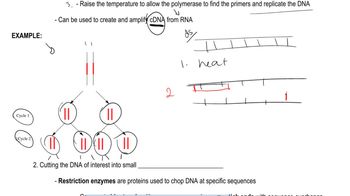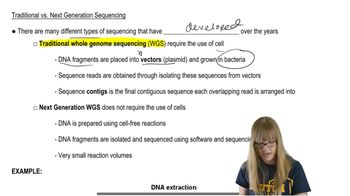Polymerase Chain Reaction (PCR)
PCR is a molecular biology technique used to amplify specific segments of DNA. It involves repeated cycles of denaturation, annealing, and extension, allowing for exponential replication of the target DNA sequence. Each cycle theoretically doubles the amount of DNA, making it a powerful tool for genetic analysis.
Recommended video:
Exponential Growth in PCR
In PCR, the amount of DNA doubles with each cycle, leading to exponential growth. The formula to calculate the number of DNA copies after 'n' cycles is 2^n, where 'n' is the number of cycles. This means that after 10 cycles, there would be 2^10 (1,024) copies, after 20 cycles, 2^20 (1,048,576) copies, and after 30 cycles, 2^30 (1,073,741,824) copies.
Recommended video:
Double-Stranded DNA
Double-stranded DNA consists of two complementary strands that form a helical structure. In the context of PCR, each cycle produces new double-stranded DNA molecules from the original template. Understanding the nature of double-stranded DNA is crucial for grasping how PCR amplifies genetic material effectively.
Recommended video:






